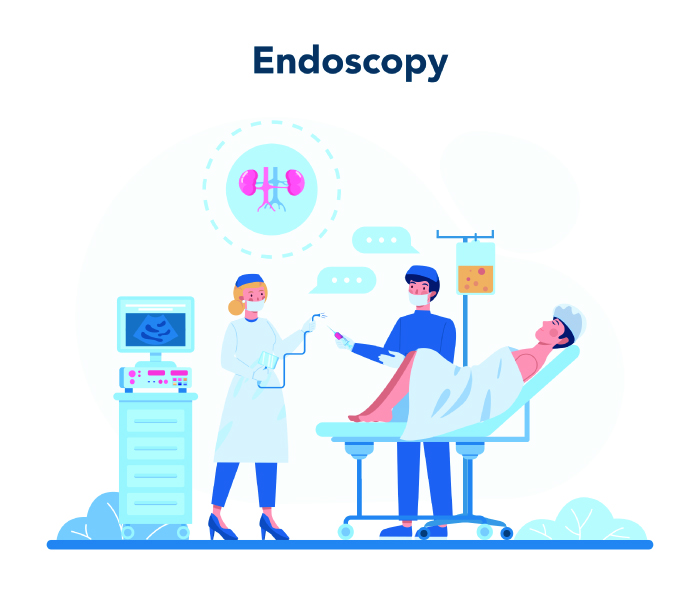Urological Endoscopy Procedure in MRC Nagar, Chennai
Problems with your urinary tract can cause extreme pain and discomfort. If you experience any pain in your pelvic region, visit a urology specialist in Chennai. The urologist will recommend a urological endoscopy to determine the cause of the pain in your urinary tract.

What is a urological endoscopy?
A urological endoscopy is conducted to diagnose the problems of the urinary tract. There are two types of urological endoscopies that your urologist may perform:
- Cystoscopy
For this procedure, the urologist will use a cystoscope to look inside the bladder and the urethra.
A cystoscope is a long instrument with an eyepiece at one end, a flexible tube in the middle, and a light and tiny lens at the other end. Through the cystoscope, the urologist will get detailed images of the linings of the bladder and the urethra.
- Ureteroscopy
The urologist will use a ureteroscope to look inside the kidneys and ureters.
Just like the cystoscope, the ureteroscope has an eyepiece at one end, a flexible tube in the middle, and a light and tiny lens at the other end. However, the ureteroscope is longer and thinner than a cystoscope. It gives the urologist detailed images of the kidneys and ureters.
During a urological endoscopy, your urologist will be looking for:
- Cancer or tumors
- A narrowed urethra
- Inflammation or infection in the urinary tract
- Stones
- Polyps
Who qualifies for a urological endoscopy?
Patients who show symptoms of urinary tract problems qualify for a urological endoscopy. Consult a urologist near you if you experience these symptoms:
- A burning sensation while urinating
- Persistent urge to pee
- Strong-smelling urine
- An abnormal colored urine
- Pain in the pelvic region
Upon examining you properly, the urologist will decide whether a urological endoscopy should be carried out or not.
Request an appointment at Apollo Spectra Hospitals, MRC Nagar, Chennai.
Call 1860 500 2244 to book an appointment.
Why is a urological endoscopy performed?
Some of the common reasons for performing a urological endoscopy include:
- Blood in the urine
- Pain while urinating
- Recurring urinary tract infections
- The urge to urinate frequently throughout the day
- Urine leakage
- Not being able to empty the bladder completely
What are the benefits of getting a urological endoscopy done?
A urological endoscopy can help:
- Find the causes of urinary tract problems - overactive bladder, blood in the urine, kidney stones or incontinence (leaking urine).
- Diagnose urinary tract conditions and diseases - urinary tract infection, bladder or kidney stones or cancer.
- Treat certain urinary tract conditions and diseases - the urologist may pass special tools through a cystoscope or a ureteroscope to treat certain conditions. For instance, microscopic tumors of the urinary tract can be removed during a urological endoscopy.
What are the risks or complications associated with a urological endoscopy?
There are certain risks associated with a urological endoscopy. These include:
- Abdominal pain
- Abnormal bleeding in the urinary tract
- Injury to the ureters, bladder or urethra
- Swelling in the surrounding tissues can lead to difficulty urinating
- Complications from anesthesia
- Bladder wall rupture
- Urethral narrowing due to swelling in the surrounding tissues
If you experience the following symptoms after your urological endoscopy, consult your urologist in Chennai:
- A fever, with or without chills
- Blood or blood clots in your urine
- A painful and burning sensation that lasts for more than two days
- Difficulty urinating
- Discomfort or pain where the scope went in
Conclusion
A urological endoscopy is a diagnostic procedure done to diagnose urinary tract problems. Although it does pose some risks, this procedure is essential for diagnosing the problems of your urinary tract. If you experience any of the symptoms of a urinary tract problem, consult a urology doctor in Chennai.
You may feel slight discomfort in your pelvic region when a urologist inserts the cystoscope into your urethra and bladder. If the urologist decides to do a biopsy, you might feel a slight pinch. After the cystoscopy, your urethra might be sore for a few days.
No, there are no alternatives to urological endoscopy. Imaging tests such as an ultrasound or CT scan may miss small lesions such as tumors in your urinary tract. Because of this reason, a urological endoscopy is recommended.
You may be able to perform regular, routine activities about a week from your ureteroscopy. However, if the urologist puts in a ureteral stent in the bladder, you may feel slight discomfort and may not be able to perform certain activities.
Symptoms
Our Top Specialities
NOTICE BOARD
CONTACT US
CONTACT US
 Book Appointment
Book Appointment


.svg)
.svg)
.svg)
.svg)








